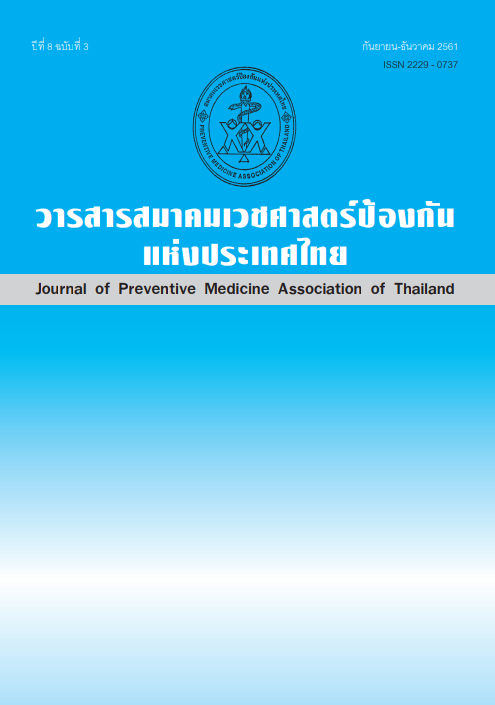Evaluation of Primary Care Cluster of Pathum Thani Province on Fiscal Year 2017
Keywords:
Operation Primary Care ClusterAbstract
Primary care cluster policy is a reformation of primary health service system by providing a family care team for 10,000 residents, under concept “Service everyone everything everywhere every-time with technology. The objective of this study was to evaluate context, input, process, and results of primary care cluster implementation by family care team in Pathum Thani province based on Context-Input-Process-Product Model (CIPP) evaluation model which was developed by Stufflebeam. A study took 7 monthsperoid (November 2017-May 2018). Samples were collected from purposive sampling and quota sampling method. The samples consisted of district health staffs, heath promoting hospital staffs, customers and elderly. Data were collected by a questionnaire. Data analysis was done by using frequency, percentage, mean, standard deviation and T-test.
The result of this study found that all Tambon Heath Promoting Hospitals (THPH) in this study passed primary care cluster standard criteria in term of context. In each dimension of THPH standard criteria, the highest score of input was Bang Ku Wat 1 95.8%. the highest score of process was Bang Ka Yang THPH and Bang Ku Wat 1 100%. In addition, the highest score of results, were Bang Ka Yang THPH and Bang Ku Wat 1 83.3%. Bang Ku Wat 1 THPH had the highest ratio of outpatient (OPD) visit between the THPH and the main hospital, which was 68:32. Additionally, 81.4% passed the criteria of self and family health care (>10.5 points). The elderly’s quality of life (5-parts) was moderate level ( =2.72, SD=0.92). The worst health condition or death (0) was 86.1%. There was not different of overall satisfactory results among THPHs providing services. The advice about how to do self-care if you get sick or how to prevent diseases, the ability of treatment, and the speed of service providing were statistically significant different at P-value 0.05.
Results by CIPP model evaluation in this study presented that the good operation of primary care cluster occur in rural areas including having starting point of continually primary care development before launching out primary care cluster policy. Those also got resource support from the main hospital. Overall, self-care in women and children need to be emphasized as a target of service improvement, and primary care cluster in THPH should focus more on proactive
operation and providing antenatal care (ANC) since the first time of ANC. THPH should emphasize on village health volunteers to do proactive activities and to promote the children 0-5 year get developmental evaluation. Also, TPHP need to focus on providing collaborated services of Long Term Care (LTC) with municipalities to provide a quality of care for the elderly in their area.
References
2. ระพีพรรณ ฉลองสุข. ระบบงานเภสัชกรรมปฐมภูมิ: กรณีศึกษาในพื้นที่รับผิดชอบของสำนักงานหลักประกันสุขภาพแห่งชาติ: เขต 5 ราชบุรี. วารสารไทยไภษัชยนิพนธ์ 2558;10(2):46-67.
3. สำเริง แหยงกระโทก. การดำเนินงานตามมาตรฐานหน่วยบริการปฐมภูมิ (Primary Care Unit=PCU). กรุงเทพฯ: โรงพิมพ์ชุมนุมสหกรณ์การเกษตรแห่งประเทศไทย จำกัด: 2560.
4. นิศา ชูโต. การประเมินโครงการ. กรุงเทพฯ: ธรรมสารการพิมพ์; 2550.
5. ไพบูลย์ สุริยะวงศ์ไพศาล, สุภา เพ่งพิศ, สมชาย วิริดิรมย์กุล, นภาพร วาณิชย์กุล, สุชาดา ภัทรมงคลฤทธิ์. โครงการวิจัยติดตามประเมินผลนโยบายทีมหมอครอบครัว. กรุงเทพฯ: โรงพิมพ์ชุมนุมสหกรณ์การเกษตรแห่งประเทศไทย จำกัด: 2558.
6. สมยศ ศรีจารนัย, พิชญาภัสสร์ วรรณศิริกุล, ปารณัฐ สุขสุทธิ์, อรณรินทร์ ขจรวงศ์วัฒนา, สมใจ นกดี. วิจัยประเมินผลการดำเนินงานตามนโยบายทีมหมอครอบครัว. กรุงเทพฯ: โรงพิมพ์ชุมนุมสหกรณ์การเกษตรแห่งประเทศไทย จำกัด; 2557.
Downloads
Published
How to Cite
Issue
Section
License
บทความที่ลงพิมพ์ในวารสารเวชศาสตร์ป้องกันแห่งประเทศไทย ถือเป็นผลงานวิชาการ งานวิจัย วิเคราะห์ วิจารณ์ เป็นความเห็นส่วนตัวของผู้นิพนธ์ กองบรรณาธิการไม่จำเป็นต้องเห็นด้วยเสมอไปและผู้นิพนธ์จะต้องรับผิดชอบต่อบทความของตนเอง






